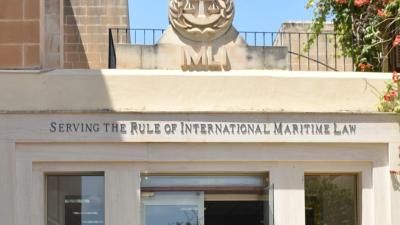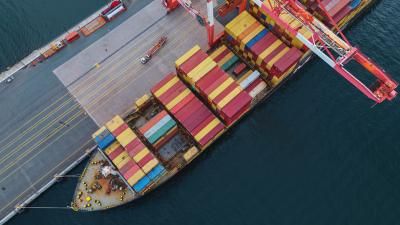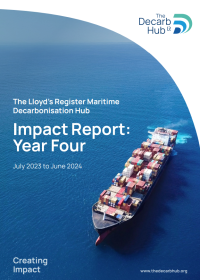
New major grant to improve safety across the maritime industry
Lloyd’s Register Foundation has awarded £1,000,000 in grant funding to the IMLI to support its work in the adoption and effective implementation of maritime legislation.
This page is approximately a 3 minute read
This page was published on

The Lloyd’s Register Maritime Decarbonisation Hub (commonly known as the Decarb Hub) has released its impact report. The Lloyd’s Register Maritime Decarbonisation Hub Impact report: year four (2023 - 2024) highlights how they have focussed attention on three specific areas – fuel adoption, risk and safety and impact and stakeholder engagement. Activity around fuel adoption has centred on techno-economic studies, policy development and facilitation of industry partnerships – driving change across the fuel supply chain. In risk and safety, the focus has been on assessment and mitigation of risks to people and the environment, resulting in new approaches to ship design, fuel storage and transport, onboard operations and crew training.
The Lloyd’s Register Maritime Decarbonisation Hub (commonly known as the Decarb Hub) is an independent, non-profit initiative established through a partnership between Lloyd’s Register Foundation — a global charity with a mission to engineer a safer world — and Lloyd’s Register Group, a global provider of maritime professional services with over 260 years of heritage.
Partners the Decarb Hub collaborated with included leading maritime businesses, regulators, governments, financiers, technology providers and NGOs. Together these initiatives delivered significant progress against all our key objectives.
In 2024, the Decarb Hub received £2.7 million in funding to support multi-year programmes, with £1.56 million recognised as income in-year and the remainder deferred in line with project delivery. We also received £347,000 in donated expertise and services, which enabled us to support the development of sustainable ocean economy finance initiatives and catalyse investment mechanisms for emissions reduction in maritime infrastructure.
The Decarb Hub continues to have impact across the sector with a number of highlights.
They have worked to make sure sustainable marine fuels can be adopted safely with the result there is a deepened industry knowledge of risks and mitigations for ammonia as marine fuel.
There has been continuing support for the managed uptake of sustainable marine fuels and the Decarb Hub has continued to grow the Silk Alliance, a coalition of organisations driving positive change across the future fuel supply chain.
Influencing appropriate and effective policy and regulations also remains key - the Decarb Hub has created relationships and grows influence with international and local authorities, with several key initiatives in flight.
The Decarb Hub also keeps the industry updated with technical and regulatory advancements and has maintained and grown the scope of Zero Carbon Fuel Monitor – providing an independent perspective on the readiness of zero carbon fuels for deployment.
To make sure today’s fleet is enabled for the future, the Decarb Hub launched the Maritime Emissions Reduction Centre to reduce barriers to the uptake of GHG reduction solutions.
During the next two years, the Decarb Hub plans to maintain a central role in supporting the green corridor cluster, identifying sources of new fuels, developing business cases for their production, and looking for ways to further aggregate demand, making fuel production more attractive. They also plan to broaden their portfolio of safety and risk activities.
Explore the latest impact report from the Lloyd's Register Maritime Decarbonisation Hub, a partnership between Lloyd's Register Foundation and Lloyd's Register that is working towards a safe, sustainable, and human-centric decarbonised shipping industry.
Download The Decarb Hub Impact report: Year Four (2023-2024) (PDF, 1.66MB)
